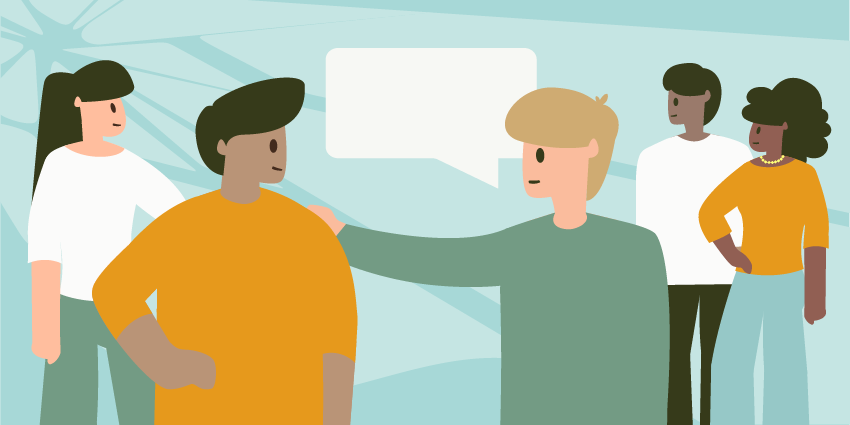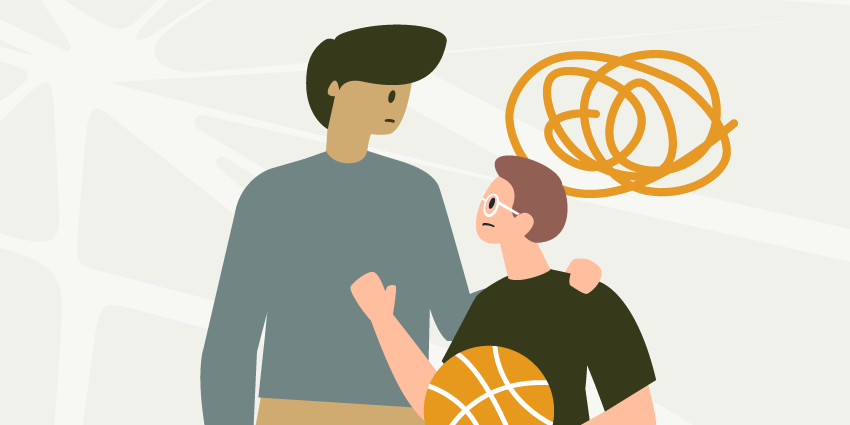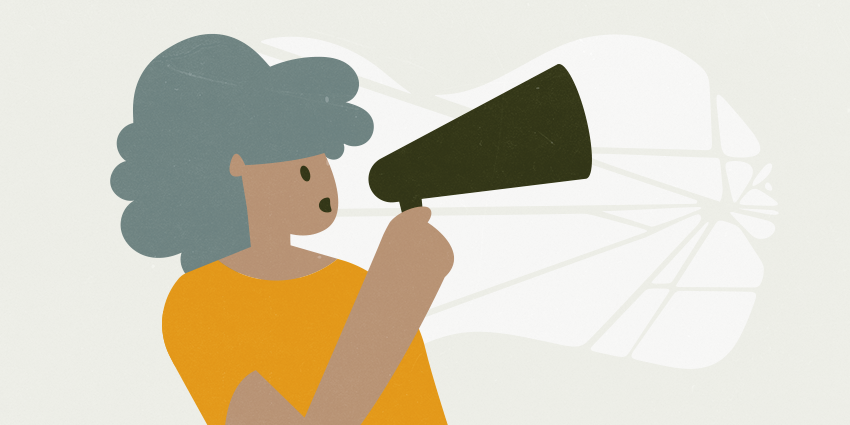To find services or supports you are comfortable with, please visit the helplines and support services page – use a friend’s phone if you think yours is being monitored.
You may be worried that a friend or relative is experiencing family and domestic violence. Understanding what family and domestic violence is and knowing how to support someone in such a situation is crucial.
Family and domestic violence doesn't have to be physical.
Coercive control is family and domestic violence. It can occur by itself or in combination with other types of abuse including physical or sexual violence.
Your support and empathy can make a big difference in helping someone feel safe enough to speak up and seek help.
Is someone you care about being abused?
Do you think your friend, neighbour, co-worker, sister, mother, or someone you know might be experiencing family and domestic violence?
Below are some signs to look out for:
- They seem scared of their partner or are always trying to please, calm or placate them.
- They often cancel plans at the last minute.
- They are afraid to make their partner unhappy or angry.
- They stop seeing family or friends.
- They end phone calls when their partner comes into the room.
- Their partner constantly calls or texts them when they are out.
- Their partner is jealous and possessive and accuses them of being with other people.
- Their partner is overly attentive, stays close to them, or keeps an eye on who they speak to.
- They have become anxious, depressed, quieter than normal and/or have lost their confidence.
- They have bruises, sprains, or cuts that they say were accidents.
- Their partner controls all the finances, and she must justify every cent she spends.
- Their partner controls their activities, how they dress, or their contact with friends and family.
- They say their partner wants them to quit their job.
- Their partner makes fun of them publicly, or you sense tension in their partner’s comments.
It can be hard to know what to do. You may feel hesitant to intrude or discuss something so personal.
Possible thoughts you might have
When you see someone you know or care about being hurt or harmed by their partner or another family member, it can lead to a range of thoughts and emotions.
You might find yourself thinking:
She must be doing something wrong to provoke his violence.
It’s not just a family problem, family and domestic violence causes serious harm to adults and children.
Surely the violence can’t really be that serious.
Family and domestic violence involves a range of different behaviours. It does not have to be physical to be dangerous.
Just because there’s no physical abuse doesn’t mean the risk of serious harm - or even death - is any lower.
Why don’t they just leave?
There are many reasons why it may be difficult for someone experiencing family and domestic violence to escape, including:
- It might be too dangerous to leave, and the person may be scared.
- They hope the person using violence will change and the violence will stop.
- They feel shame or embarrassment.
- They have been made to feel that the violence is their fault.
- They have no access to money and nowhere to go.
- They are worried about people (family and friends) not believing them.
- They believe that children need both parents.
- They fear a negative reaction from family, friends or community.
- They may not know support is available or have had previous bad experiences with support services including police and justice responses.
- They may be afraid they will lose custody of their children.
- They may feel shame or denial, worrying that people might think they don’t care about their children.
This might be confusing for you as a friend or family member ‘looking in’, and believing a person you care about is choosing to stay in a relationship where their partner is abusing them. Supporting a victim-survivor to make their own decisions about how to create safety for themselves and/or their children, is an important way to help. Family and domestic violence specialist services can provide more information about this.
What if my friend has children?
A victim-survivor who is experiencing family and domestic violence will usually be the expert in their own safety, and the safety of their children.
Family and domestic violence involves coercive control, and emotional and psychological abuse. This type of abuse may include the perpetrator threatening to stop the victim-survivor from seeing their children.
Often, when a person leaves a relationship where their partner is abusing them, this can be the most dangerous time for the victim-survivor and their children. This is why supports are so important for a person experiencing family and domestic violence.
He’s my friend I don’t think he would hurt anyone.
Many perpetrators don’t show signs of violence in their relationships with friends, other family members, or colleagues. This may cause the victim-survivor (adults and children) to fear they won’t be believed.
Just because you’ve never seen the abusive behaviour, doesn’t mean it doesn’t happen.
Many abusers don’t use physical violence to hurt their partner. Using coercive control to scare, intimidate, or isolate someone can seriously affect someone’s mental and physical health, employment, relationships, financial security and sense of autonomy. It makes them feel trapped, powerless and alone.
The absence of physical violence does not mean a victim-survivor is safe, and it does not mean the risk of serious harm - or even death - is any lower.
How can they care for someone who hurts them?
Violent and abusive behaviours are usually a pattern, and they are mixed in with what can feel like loving, or even safe, behaviours. Many women leave and return to their partner multiple times before they leave for good.
An important consideration is the victim-survivor’s level of fear. Many victim-survivors stay in a relationship, or return to a relationship, because they fear what the perpetrator will do to them, or their children, if they leave.
Why don’t they just tell someone?
Some victim-survivors:
- Fear of being judged or blamed.
- Believe that the violence and abuse will get worse, if other people get involved.
- Worry they won’t be able to support themselves and their children alone; family and domestic violence often involve financial abuse, that takes away a victim-survivor's financial independence.
- Feel guilty or responsible for the violence.
- Sometimes there are cultural influences that make it difficult for a victim-survivor to tell someone about their experience of family and domestic violence.
- Fear their children being taken away by him or put into foster care.
How you can help
When someone close to you is experiencing family and domestic violence, how you talk and listen to them is very important. There are simple things you can do to make a big difference:
- Express your concerns and ask them if they’re ok in a safe space. Try “You haven’t seemed yourself lately. Is everything ok at home? Is there anything you want to talk about?”
- Believe in the person and take their fears seriously. This is important no matter what you think of the person who hurt them.
- Listen without interrupting or judging. Help build a support system and encourage them to keep in regular contact.
- Understand that they may not be ready, or it may not be safe to leave. Don’t try to force them to do what you think is best.
- Help them make a safety plan, like transport, childcare, appointments or offering a safe place to stay or to keep important documents or possessions. There are specialist family and domestic violence support services, who can help you create a safety plan.
- Help explore options. You or the person you are supporting can call family and domestic violence support helplines and services to get advice specific to your situation.
- Respect the knowledge and understanding that the victim-survivor has about their own situation. The person experiencing family and domestic violence, is the expert in their own safety, and it is important they feel supported and empowered to make their own decisions, about what is right for them.
Try to avoid
Things to avoid when talking to a friend or family member experiencing domestic violence:
- Judgement or criticism. This may make them feel isolated, making them too afraid or ashamed to talk about the abuse.
- Blaming the person experiencing the violence. Violence is never ok. Let them know that the abuse is not their fault, and everyone deserves to be treated with respect.
- Making excuses for the perpetrator. Don’t blame alcohol, drugs, or mental health issues for his choice to use violent and abusive behaviour.
- Pressuring them to leave the relationship and avoid telling them what they should do.
- Making negative comments about her partner. This can make them feel more isolated and judged, and may discourage them from sharing more information.
- Don’t give up on them. Seeing someone you care about stay in a relationship where their partner is abusing them can be difficult. There are many reasons a victim survivor does not leave, including that it might be unsafe to leave. Remind them you care about them and are there to support them.
Download the fact sheet on how to help someone experiencing coercive control:
Fact Sheet: Coercive control - How to help someone
Important information to remember when supporting someone experiencing family and domestic violence
- Based on the 2021–22 Personal Safety Survey, over 1 in 4 women have experienced family and domestic violence since the age of 15.
- Remember, family and domestic violence doesn't have to be physical. Coercive control is a form of family and domestic violence on its own and is almost always a factor in relationships with someone using violence.
- The perpetrator is responsible for the violence and abuse. The victim is not.
- Family and domestic violence is a crime. Criminal offences can include assault, sexual assault, making threats about a person’s safety, stalking, property damage or theft, and violating Restraining Orders.
- Every woman and child has the right to live free from violence and abuse.
- Family and domestic violence is never acceptable and is never part of anyone’s culture or religion.
- Leaving a relationship with someone using violence can be dangerous. The risk of injury or even death is greatest when leaving a relationship where their partner is abusing them or shortly after.
- The victim-survivor is likely the expert in their own safety.
Help and support
If you, or someone you know, is in immediate danger, call the police now on 000.
If it’s not an emergency and you need support, you can call these numbers 24 hours a day, seven days a week.
- 1800RESPECT: a national sexual assault, domestic family violence counselling service. Phone: 1800 737 732.
- Women’s Domestic Violence Helpline: provides support for women, with or without children, who are experiencing family and domestic violence in Western Australia (including referrals to women’s refuges). Phone: 1800 007 339. *This helpline is operated by Department of Communities, and your call will be answered by a child protection worker. We are here to help.
- Men’s Domestic Violence Helpline: provides telephone information and referrals for men who are concerned about their violent and abusive behaviours, and for male victims of family and domestic violence in Western Australia. Phone: 1800 000 599. *This helpline is operated by Department of Communities, and your call will be answered by a child protection worker. We are here to help.
- Kids Helpline: provides free support and counselling (talking through problems) to people aged 5-25. Phone: 1800 551 800
- Concern for a child's wellbeing: If you are concerned about a child's wellbeing, please contact the Department of Communities Child Protection Central Intake Team on 1800 273 889. If you are calling outside of business hours, Crisis Care is available on 1800 199 008 and provides Western Australia’s after-hours response to reported concerns for a child’s safety and wellbeing and information and referrals for people experiencing crisis. For more information about child protection, please visit Child protection.
Find more support services and helplines here:
Family and domestic violence helplines and support services
Other helpful resources about helping someone experiencing family and domestic violence
Find more advice and information about supporting someone in a family and domestic violence situation:






